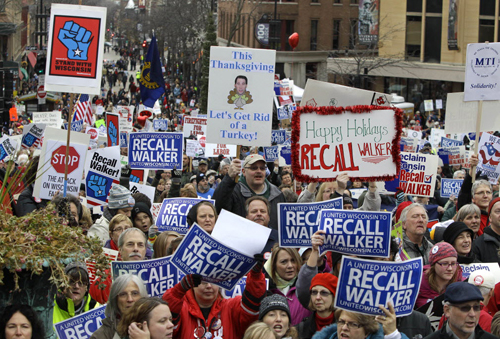Wisconsin lessons for Illinois unions... Before it's too late...
 The massive and dramatic protests that filled the Wisconsin state capitol building (above) against Governor Scott Walker's union busting plans and legislative proposals made international news in early 2011. What was left out of the narrative, however, was that Walker had won power in Wisconsin because of the same lame policies of the Democratic Party that were to result, a few years later, in the Donald Trump presidency.[The following article article appeared more than a year ago -- before Donald Trump was elected President -- and should serve as a warning for Chicago and Illinois. The article is excerpted here. If readers want to read the whole thing there is the citation. Even though Chicago Teachers Union members joined the fight against Scott Walker's union busting agenda five years ago, this article, from The Washington Post, is a reminder of what can happen if Rauner, Rahm and the reactionaries (in both parties) get their way. The following is an excerpt from an article recently in the Washington Post on the aftermath of Wisconsin's 'right to work' (but more let's gut the unions) law. CTU must look at how this might happen here in Illinois if Rauner, Rahm and Trump have their way. CTU needs to focus more on how to ensure this will not happen here and pay more attention to the rank and file members' attitude toward the direction the union is taking. Not all the members are happy at the 'social justice' slant at the expense of a good contract, better wages and working conditions. Susan Hickey, Substance staff].
The massive and dramatic protests that filled the Wisconsin state capitol building (above) against Governor Scott Walker's union busting plans and legislative proposals made international news in early 2011. What was left out of the narrative, however, was that Walker had won power in Wisconsin because of the same lame policies of the Democratic Party that were to result, a few years later, in the Donald Trump presidency.[The following article article appeared more than a year ago -- before Donald Trump was elected President -- and should serve as a warning for Chicago and Illinois. The article is excerpted here. If readers want to read the whole thing there is the citation. Even though Chicago Teachers Union members joined the fight against Scott Walker's union busting agenda five years ago, this article, from The Washington Post, is a reminder of what can happen if Rauner, Rahm and the reactionaries (in both parties) get their way. The following is an excerpt from an article recently in the Washington Post on the aftermath of Wisconsin's 'right to work' (but more let's gut the unions) law. CTU must look at how this might happen here in Illinois if Rauner, Rahm and Trump have their way. CTU needs to focus more on how to ensure this will not happen here and pay more attention to the rank and file members' attitude toward the direction the union is taking. Not all the members are happy at the 'social justice' slant at the expense of a good contract, better wages and working conditions. Susan Hickey, Substance staff].
Walker’s anti-union law has labor reeling in Wisconsin, By Robert Samuels, Washington Post, February 22, 2015 at 10:50 PM
KING, Wis. — At the old union hall here on a recent afternoon, Terry Magnant sat at the head of a table surrounded by 18 empty chairs. A members meeting had been scheduled to start a half-hour earlier, but the small house, with its cracked walls and loose roof shingles, was lonely and desolate. “There used to be a lot more people coming,” said Magnant, a 51-year-old nursing assistant, sighing. The anti-union law passed here four years ago, which made Gov. Scott Walker a national Republican star and a possible presidential candidate, has turned out to be even more transformative than many had predicted.
Walker had vowed that union power would shrink, workers would be judged on their merits, and local governments would save money. Unions had warned that workers would lose benefits and be forced to take on second jobs or find new careers.
Many of those changes came to pass, but the once-thriving public-sector unions were not just shrunken — they were crippled. Unions representing teachers, professors, trash collectors and other government employees are struggling to stem plummeting membership rolls and retain relevance in the state where they got their start…
 The massive movement to protest the union busting of then newly elected Wisconsin Governor Scott Walker led into the "Recall Walker" movement. The movement got more than a million signatures on recall petitions, but then blew their chances by putting a Wisconsin version of Rahm Emanuel as the Democratic Party alternative to Walker and using many of the same diversity first arguments before the actual voting, must as the Democrats have done in their suicidal work in the 2016 election for President of the United States: poor candidate, ignoring the actual working class issues facing the voters, and too much emphasis on the myths of protest politics as opposed to work in the precincts county by county. But recalling the benefits that union membership might have brought before the 2011 law stripped most public-sector unions of their collective-bargaining rights is difficult when workers consider the challenges of the present. “I don’t see the point of being in a union anymore,” said Dan Anliker, a 34-year-old technology teacher and father of two in Reedsburg, a tiny city about 60 miles northwest of Madison.
The massive movement to protest the union busting of then newly elected Wisconsin Governor Scott Walker led into the "Recall Walker" movement. The movement got more than a million signatures on recall petitions, but then blew their chances by putting a Wisconsin version of Rahm Emanuel as the Democratic Party alternative to Walker and using many of the same diversity first arguments before the actual voting, must as the Democrats have done in their suicidal work in the 2016 election for President of the United States: poor candidate, ignoring the actual working class issues facing the voters, and too much emphasis on the myths of protest politics as opposed to work in the precincts county by county. But recalling the benefits that union membership might have brought before the 2011 law stripped most public-sector unions of their collective-bargaining rights is difficult when workers consider the challenges of the present. “I don’t see the point of being in a union anymore,” said Dan Anliker, a 34-year-old technology teacher and father of two in Reedsburg, a tiny city about 60 miles northwest of Madison.
The law required most public employees to pay more for health insurance and to pay more into retirement savings, resulting in an 8 to 10 percent drop in take-home pay. To help compensate for the loss, Anliker said he took an additional 10-hour-a-week job. “Everyone’s on their own island now,” he said. “If you do a good job, everything will take care of itself. The money I’d spend on dues is way more valuable to buy groceries for my family.”
Sean Karsten, a 32-year-old middle and high school reading instructor in his first year of teaching in Reedsburg, said the unions are “just not something I concern myself with.” “I just look to keep improving my teaching in the best way I can and try to keep my nose out of the other stuff,” he said.
Walker has pointed to the unions’ membership troubles as a victory — presenting himself as a conservative warrior unafraid of taking on big battles against liberal interests.
Walker’s administration has said forcing public employees to contribute more to retirement plans and health insurance helped local governments save $3 billion. The governor also has credited the 2011 law with saving homeowners money on property taxes while giving school districts the ability to make reforms that increased third-grade reading levels and high school graduation rates. And the law has emboldened Republican state lawmakers to further challenge Wisconsin’s labor movement this year by pushing right-to-work legislation that would allow private-sector workers to opt out of paying union dues — a measure Walker has said he would sign.
“We took the power away from the big-government special interests and put it firmly in the hands of the hard-working taxpayers,” Walker told Iowa Republicans recently. “That is what we need more of in this great country. The liberals don’t like that.”
Union officials declined to release precise membership data but confirmed in interviews that enrollment is dramatically lower since the new law was signed in 2011.
The state branch of the National Education Association, once 100,000 strong, has seen its membership drop by a third. The American Federation of Teachers, which organized in the college system, saw a 50 percent decline. The 70,000-person membership in the state employees union has fallen by 70 percent. The decline is politically significant in Wisconsin, a presidential battleground where the unions have played a central role in Democrats’ get-out-the-vote drives.
John Ahlquist, a University of Wisconsin political scientist who specializes in labor movements, said Walker had “effectively dismantled the financial and organizing structure of unions in Wisconsin.” “Although it is too early to tell if unions are near the end of their political power here, they are in a very vulnerable position,” Ahlquist said.
[Samuels, R. (2015, February 22). Walker’s anti-union law has labor reeling in Wisconsin. Washington Post. Retrieved from https://www.washingtonpost.com/amphtml/politics/in-wisconsin-walkers-anti-union-law-has-crippled-labor-movement/2015/02/22/1eb3ef82-b6f1-11e4-aa05-1ce812b3fdd2_story.html]


By: Susan Hickey, LCSW
Russian and other hackings
Why does some imbecile in Russia or other countries feel they need to hack into this! You should get ready to celebrate your puppet- Trump- is going to be sworn in next week!